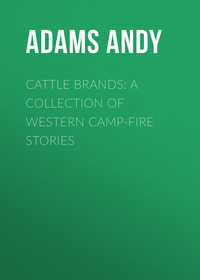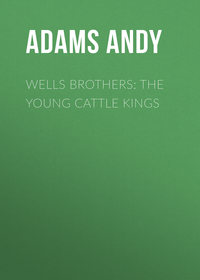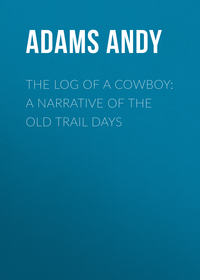 полная версия
полная версияReed Anthony, Cowman: An Autobiography
A good foreman is a very important man in trail work. The drover or firm may or may not be practical cowmen, but the executive in the field must be the master of any possible situation that may arise, combining the qualities of generalship with the caution of an explorer. He must be a hail-fellow among his men, for he must command by deserving obedience; he must know the inmost thoughts of his herd, noting every sign of alarm or distress, and willingly sacrifice any personal comfort in the interest of his cattle or outfit. I had a few such men, boys who had grown up in my employ, several of whom I would rather trust in a dangerous situation with a herd than take active charge myself. No concern was given for their morals, but they must be capable, trustworthy, and honest, as they frequently handled large sums of money. All my old foremen swore by me, not one of them would accept a similar situation elsewhere, and in selecting the extra trail bosses their opinion was valued and given due consideration.
Not having driven anything from my ranch the year before, a fine herd of twos, threes, and four-year-old steers could easily be made up. It was possible that a tenth and individual herd might be sent up the country, but no movement to that effect was decided on, and my regular ranch hands had orders only to throw in on the home range and gather outside steer cattle and dry cows. I had wintered all my saddle horses on the Clear Fork, and once the foremen were decided on, they repaired to the ranch and began outfitting for the start. The Coryell herds were to be received one week later than the beef cattle, and the outfits would necessarily have to start in ample time to meet us on our return from the upper Nueces River country. The two foremen allotted to Hood County would start a week later still, so that we would really move north with the advance of the season in receiving the cattle under contract. Only a few days were required in securing the necessary foremen, a remuda was apportioned to each, and credit for the commissary supplies arranged for, the employment of the men being left entirely to the trail bosses. Taking two of my older foremen with me, I started for Fort Worth, where an agreeable surprise awaited me. We had been underbidden at the War Department on both our proposals for northern wintered beeves. The fortunate bidder on one contract was refused the award,—for some duplicity in a former transaction, I learned later,—and the Secretary of War had approached our silent partner to fill the deficiency. Six weeks had elapsed, there was no obligation outstanding, and rather than advertise and relet the contract, the head of the War Department had concluded to allot the deficiency by private award. Major Hunter had been burning the wires between Fort Worth and Washington, in order to hold the matter open until I came in for a consultation. The department had offered half a cent a pound over and above our previous bid, and we bribed an operator to reopen his office that night and send a message of acceptance. We had ten thousand cattle wintering on the Medicine River, and it would just trim them up nicely to pick out all the heavy, rough beeves for filling an army contract.
When we had got a confirmation of our message, we proceeded on south, accompanied by the two foremen, and reached Uvalde County within a week of the time set for receiving. Edwards had two good remudas in pastures, wagons and teams secured, and cooks and wranglers on hand, and it only remained to pick the men to complete the outfits. With three old trail foremen on the alert for good hands while the gathering and receiving was going on, the help would be ready in ample time to receive the herds. Gathering the beeves was in active operation on our arrival, a branding chute had been built to facilitate the work, and all five of us took to the saddle in assisting ranchmen in holding under herd, as we permitted nothing to be corralled night or day. The first herd was completed on the 14th, and the second a day later, both moving out without an hour's delay, the only instructions being to touch at Great Bend, Kansas, for final orders. The cattle more than came up to expectations, three fourths of them being six and seven years old, and as heavy as oxen. There was something about the days of the open range that left its impression on animals, as these two herds were as uniform in build as deer, and I question if the same country to-day has as heavy beeves.
Three days were lost in reaching Coryell County, where our outfits were in waiting and twenty others were at work gathering cattle. The herds were made up and started without a hitch, and we passed on to Hood County, meeting every date promptly and again finding the trail outfits awaiting us. Leaving my active partner and George Edwards to receive the two herds, I rode through to the Clear Fork in a single day. A double outfit had been at work for the past two weeks gathering outside cattle and had over a thousand under herd on my arrival. Everything had worked out so nicely in receiving the purchased herds that I finally concluded to send out my steers, and we began gathering on the home range. By making small round-ups, we disturbed the young calves as little as possible. I took charge of the extra outfit and my ranch foreman of his own, one beginning on the west end of my range, the other going north and coming down the Brazos. At the end of a week the two crews came together with nearly eight thousand cattle under herd. The next day we cut out thirty-five hundred cows and started them on the trail, turning free the remnant of she stuff, and began shaping up the steers, using only the oldest in making up thirty-two hundred head. There were fully two thousand threes, the remainder being nearly equally divided between twos and fours. No road branding was necessary; the only delay in moving out was in provisioning a wagon and securing a foreman. Failing in two or three quarters, I at last decided on a young fellow on my ranch, and he was placed in charge of the last herd. Great Bend was his destination, I instructed him where to turn off the Chisholm trail,—north of the Salt Fork in the Cherokee Outlet,—and he started like an army with banners.
I rejoined my active partner at Fort Worth. The Hood County cattle had started a week before, so taking George Edwards with us, we took train for Kansas. Major Hunter returned to his home, while Edwards and I lost no time in reaching the Medicine River. A fortnight was spent in riding our northern range, when we took horses and struck out for Pond Creek in the Outlet. The lead herds were due at this point early in May, and on our arrival a number had already passed. A road house and stage stand had previously been established, the proprietor of which kept a register of passing herds for the convenience of owners. None of ours were due, yet we looked over the "arrivals" with interest, and continued on down the trail to Red Fork. The latter was a branch of the Arkansas River, and at low water was inclined to be brackish, and hence was sometimes called the Salt Fork, with nothing to differentiate it from one of the same name sixty miles farther north. There was an old Indian trading post at Red Fork, and I lay over there while Edwards went on south to meet the cows. His work for the summer was to oversee the deliveries at the Indian agencies, Major Hunter was to look after the market at The Bend, and I was to attend to the contracts at army posts on the upper Missouri. Our first steer herd to arrive was from Hood County, and after seeing them safely on the Great Bend trail at Pond Creek, I waited for the other steer cattle from Coryell to arrive. Both herds came in within a day of each other, and I loitered along with them, finally overtaking the lead one when within fifty miles of The Bend. In fair weather it was a delightful existence to loaf along with the cattle; but once all three herds reached their destination, two outfits held them, and I took the Hood County lads and dropped back on the Medicine. Our ranch hands had everything shaped up nicely, and by working a double outfit and making round-ups at noon, when the cattle were on water, we quietly cut out three thousand head of our biggest beeves without materially disturbing our holdings on that range. These northern wintered cattle were intended for delivery at Fort Abraham Lincoln on the Missouri River in what is now North Dakota. The through heavy beeves from Uvalde County were intended for Fort Randall and intermediate posts, some of them for reissue to various Indian agencies. The reservations of half a dozen tribes were tributary to the forts along the upper Missouri, and the government was very liberal in supplying its wards with fresh beef.
The Medicine River beeves were to be grazed up the country to Fort Lincoln. We passed old Fort Larned within a week, and I left the outfit there and returned to The Bend. The outfit in charge of the wintered cattle had orders to touch at and cross the Missouri River at Fort Randall, where I would meet them again near the middle of July. The market had fairly opened at Great Bend, and I was kept busy assisting Major Hunter until the arrival of the Uvalde beef herds. Both came through in splendid condition, were admired by every buyer in the market, and passed on north under orders to graze ten miles a day until reaching their destination. By this time the whereabouts of all the Indian herds were known, yet not a word had reached me from the foreman of my individual cattle after crossing into the Nations. It was now the middle of June, and there were several points en route from which he might have mailed a letter, as did all the other foremen. Herds, which crossed at Red River Station a week after my steers, came into The Bend and reported having spoken no "44" cattle en route. I became uneasy and sent a courier as far south as the state line, who returned with a comfortless message. Finally a foreman in the employ of Jess Evens came to me and reported having taken dinner with a "44" outfit on the South Canadian; that the herd swam the river that afternoon, after which he never hailed them again. They were my own dear cattle, and I was worrying; I was overdue at Fort Randall, and in duty bound to look after the interests of the firm. Major Hunter came to the rescue, in his usual calm manner, and expressed his confidence that all would come out right in the end; that when the mystery was unraveled the foreman would be found blameless.
I took a night train for the north, connected with a boat on the Missouri River, and by finally taking stage reached Fort Randall. The mental worry of those four days would age an ordinary man, but on my arrival at the post a message from my active partner informed me that my cattle had reached Dodge City two weeks before my leaving. Then the scales fell from my eyes, as I could understand that when inquiries were made for the Salt Fork, some wayfarer had given that name to the Red Fork; and the new Dodge trail turned to the left, from the Chisholm, at Little Turkey, the first creek crossed after leaving the river. The message was supplemented a few days later by a letter, stating that Dodge City would possibly be a better market than the Bend, and that my interests would be looked after as well as if I were present. A load was lifted from my shoulders, and when the wintered cattle passed Randall, the whole post turned out to see the beef herd on its way up to Lincoln. The government line of forts along the Missouri River had the whitest lot of officers that it was ever my good fortune to meet. I was from Texas, my tongue and colloquialisms of speech proclaimed me Southern-born, and when I admitted having served in the Confederate army, interest and attention was only heightened, while every possible kindness was simply showered on me.
The first delivery occurred at Fort Lincoln. It was a very simple affair. We cut out half a dozen average beeves, killed, dressed, and weighed them, and an honest average on the herd was thus secured. The contract called for one and a half million pounds on foot; our tender overran twelve per cent; but this surplus was accepted and paid for. The second delivery was at Fort Pierre and the last at Randall, both of which passed pleasantly, the many acquaintances among army men that summer being one of my happiest memories. Leaving Randall, we put in to the nearest railroad point returning, where thirty men were sent home, after which we swept down the country and arrived at Great Bend during the last week in September. My active partner had handled his assignment of the summer's work in a masterly manner, having wholesaled my herd at Dodge City at as good figures as our other cattle brought in retail quantities at The Bend. The former point had received three hundred and fifty thousand Texas cattle that summer, while every one conceded that Great Bend's business as a trail terminal would close with that season. The latter had handled nearly a quarter-million cattle that year, but like Abilene, Wichita, and other trail towns in eastern Kansas, it was doomed to succumb to the advance guard of pioneer settlers.
The best sale of the year fell to my active partner. Before the shipping season opened, he sold, range count, our holdings on the Medicine River, including saddle stock, improvements, and good will. The cattle might possibly have netted us more by marketing them, but it was only a question of time until the flow of immigration would demand our range, and Major Hunter had sold our squatter's rights while they had a value. A new foreman had been installed on our giving up possession, and our old one had been skirmishing the surrounding country the past month for a new range, making a favorable report on the Eagle Chief in the Outlet. By paying a trifling rental to the Cherokee Nation, permission could be secured to hold cattle on these lands, set aside as a hunting ground. George Edwards had been rotting all summer in issuing cows at Indian agencies, but on the first of October the residue of his herds would be put in pastures or turned free for the winter. Major Hunter had wound up his affairs at The Bend, and nothing remained but a general settlement of the summer's work. This took place at Council Grove, our silent partner and Edwards both being present. The profits of the year staggered us all. I was anxious to go home, the different outfits having all gone by rail or overland with the remudas, with the exception of the two from Uvalde, which were property of the firm. I had bought three hundred extra horses at The Bend, sending them home with the others, and now nothing remained but to stock the new range in the Cherokee Outlet. Edwards and my active partner volunteered for this work, it being understood that the Uvalde remudas would be retained for ranch use, and that not over ten thousand cattle were to be put on the new range for the winter. Our silent partner was rapidly awakening to the importance of his usefulness in securing future contracts with the War and Indian departments, and vaguely outlining the future, we separated to three points of the compass.
CHAPTER XIV
ESTABLISHING A NEW RANCH
I hardly knew Fort Worth on my return. The town was in the midst of a boom. The foundations of many store buildings were laid on Monday morning, and by Saturday night they were occupied and doing a land-office business. Lots that could have been bought in the spring for one hundred dollars were now commanding a thousand, while land scrip was quoted as scarce at twenty-five cents an acre. I hurried home, spoke to my wife, and engaged two surveyors to report one week later at my ranch on the Clear Fork. Big as was the State and boundless as was her public domain, I could not afford to allow this advancing prosperity to catch me asleep again, and I firmly concluded to empty that little tin trunk of its musty land scrip. True enough, the present boom was not noticeable on the frontier, yet there was a buoyant feeling in the air that betokened a brilliant future. Something enthused me, and as my creed was land and cattle, I made up my mind to plunge into both to my full capacity.
The last outfit to return from the summer's drive was detained on the Clear Fork to assist in the fall branding. Another one of fifteen men all told was chosen from the relieved lads in making up a surveying party, and taking fifty saddle horses and a well-stocked commissary with us, we started due west. I knew the country for some distance beyond Fort Griffin, and from late maps in possession of the surveyors, we knew that by holding our course, we were due to strike a fork of the mother Brazos before reaching the Staked Plain. Holding our course contrary to the needle, we crossed the Double Mountain Fork, and after a week out from the ranch the brakes which form the border between the lowlands and the Llano Estacado were sighted. Within view of the foothills which form the approach of the famous plain, the Salt and Double Mountain forks of the Brazos are not over twelve miles apart. We traveled up the divide between these two rivers, and when within thirty miles of the low-browed borderland a halt was called and we went into camp. From the view before us one could almost imagine the feelings of the discoverer of this continent when he first sighted land; for I remember the thrill which possessed our little party as we looked off into either valley or forward to the menacing Staked Plain in our front. There was something primal in the scene,—something that brought back the words, "In the beginning God created the heavens and the earth." Men who knew neither creed nor profession of faith felt themselves drawn very near to some great creative power. The surrounding view held us spellbound by its beauty and strength. It was like a rush of fern-scents, the breath of pine forests, the music of the stars, the first lovelight in a mother's eye; and now its pristine beauty was to be marred, as covetous eyes and a lust of possession moved an earth-born man to lay hands on all things created for his use.
Camp was established on the Double Mountain Fork. Many miles to the north, a spur of the Plain extended eastward, in the elbow of which it was my intention to locate the new ranch. A corner was established, a meridian line was run north beyond the Salt Fork and a random one west to the foothills. After a few days one surveyor ran the principal lines while the other did the cross-sectioning and correcting back, both working from the same camp, the wagon following up the work. Antelope were seen by the thousands, frequently buffaloes were sighted, and scarcely a day passed but our rifles added to the larder of our commissary supplies. Within a month we located four hundred sections, covering either side of the Double Mountain Fork, and embracing a country ten miles wide by forty long. Coming back to our original meridian line across to the Salt Fork, the work of surveying that valley was begun, when I was compelled to turn homeward. A list of contracts to be let by the War and Interior departments would be ready by December 1, and my partners relied on my making all the estimates. There was a noticeable advance of fully one dollar a head on steer cattle since the spring before, and I was supposed to have my finger on the pulse of supply and prices, as all government awards were let far in advance of delivery. George Edwards had returned a few days before and reported having stocked the new ranch in the Outlet with twelve thousand steers. The list of contracts to be let had arrived, and the two of us went over them carefully. The government was asking for bids on the delivery of over two hundred thousand cattle at various posts and agencies in the West, and confining ourselves to well-known territory, we submitted bids on fifteen awards, calling for forty-five thousand cattle in their fulfillment.
Our estimates were sent to Major Hunter for his approval, who in turn forwarded them to our silent partner at Washington, to be submitted to the proper departments. As the awards would not be made until the middle of January, nothing definite could be done until then, so, accompanied by George Edwards, I returned to the surveying party on the Salt Fork of the Brazos. We found them busy at their work, the only interruption having been an Indian scare, which only lasted a few days. The men still carried rifles against surprise, kept a scout on the lookout while at work, and maintained a guard over the camp and remuda at night. During my absence they had located a strip of country ten by thirty miles, covering the valley of the Salt Fork, and we still lacked three hundred sections of using up the scrip. The river, along which they were surveying, made an abrupt turn to the north, and offsetting by sections around the bend, we continued on up the valley for twenty miles or until the brakes of the Plain made the land no longer desirable. Returning to our commencement point with still one hundred certificates left, we extended the survey five miles down both rivers, using up the last acre of scrip. The new ranch was irregular in form, but it controlled the waters of fully one million acres of fine grazing land and was clothed with a carpet of nutritive grasses. This was the range of the buffalo, and the instinct of that animal could be relied on in choosing a range for its successor, the Texas cow.
The surveying over, nothing remained but the recording of the locations at the county seat to which for legal purposes this unorganized country was attached. All of us accompanied the outfit returning, and a gala week we spent, as no less than half a dozen buffalo robes were secured before reaching Fort Griffin. Deer and turkey were plentiful, and it was with difficulty that I restrained the boys from killing wantonly, as they were young fellows whose very blood yearned for the chase or any diverting excitement. We reached the ranch on the Clear Fork during the second week in January, and those of the outfit who had no regular homes were made welcome guests until work opened in the spring. My calf crop that fall had exceeded all expectations, nearly nine thousand having been branded, while the cattle were wintering in splendid condition. There was little or nothing to do, a few hunts with the hounds merely killing time until we got reports from Washington. In spite of all competition we secured eight contracts, five with the army and the remainder with the Indian Bureau.
Then the work opened in earnest. My active partner was due the first of February, and during the interim George Edwards and I rode a circle of five counties in search of brands of cattle for sale. In the course of our rounds a large number of whole stocks were offered us, but at firmer prices, yet we closed no trades, though many brands were bargains. It was my intention to stock the new ranch on the Double Mountain Fork the coming summer, and if arrangements could be agreed on with Major Hunter, I might be able to repeat my success of the summer of '74. Emigration to Texas was crowding the ranches to the frontier, many of them unwillingly, and it appealed to me strongly that the time was opportune for securing an ample holding of stock cattle. The appearance of my active partner was the beginning of active operations, and after we had outlined the programme for the summer and gone through all the details thoroughly, I asked for the privilege of supplying the cows on the Indian contracts. Never did partners stand more willingly by each other than did the firm of Hunter, Anthony & Co., and I only had to explain the opportunity of buying brands at wholesale, sending the young steers up the trail and the aging, dry, and barren cows to Indian agencies, to gain the hearty approval of the little Yankee major. He was entitled to a great deal of credit for my holdings in land, for from his first sight of Texas, day after day, line upon line, precept upon precept, he had urged upon me the importance of securing title to realty, while its equivalent in scrip was being hawked about, begging a buyer. Now we rejoiced together in the fulfillment of his prophecy, as I can lay little claim to any foresight, but am particularly anxious to give credit where credit is due.
With an asylum for any and all remnants of stock cattle, we authorized George Edwards to close trades on a number of brands. Taking with us the two foremen who had brought beef herds out of Uvalde County the spring before, the major and I started south on the lookout for beeves. The headwaters of the Nueces and its tributaries were again our destination, and the usual welcome to buyers was extended with that hospitality that only the days of the open range knew and practiced. We closed contracts with former customers without looking at their cattle. When a ranchman gave us his word to deliver us as good or better beeves than the spring before, there was no occasion to question his ability, and the cattle never deceived. There might arise petty wrangles over trifles, but the general hungering for a market among cowmen had not yet been satiated, and they offered us their best that we might come again. We placed our contracts along three rivers and over as many counties, limiting the number to ten thousand beeves of the same ages and paying one dollar a head above the previous spring. One of our foremen was provided with a letter of credit, and the two were left behind to make up three new and complete outfits for the trail.








